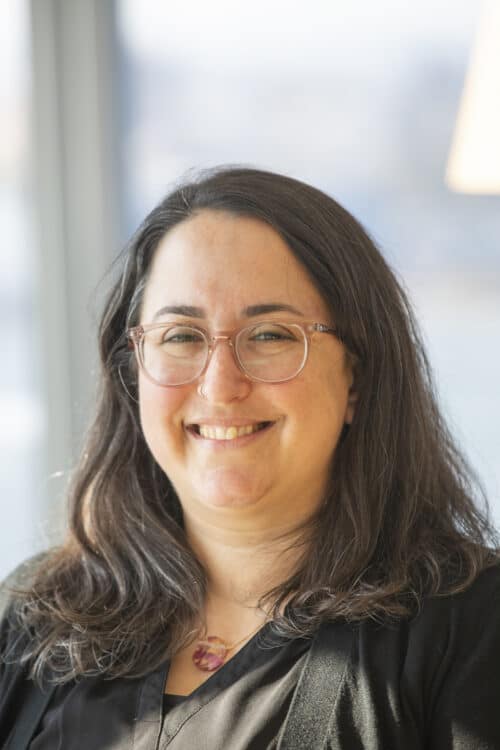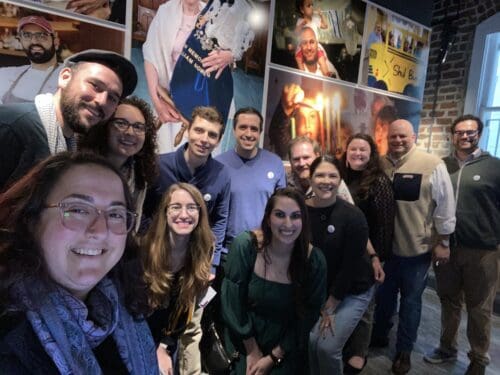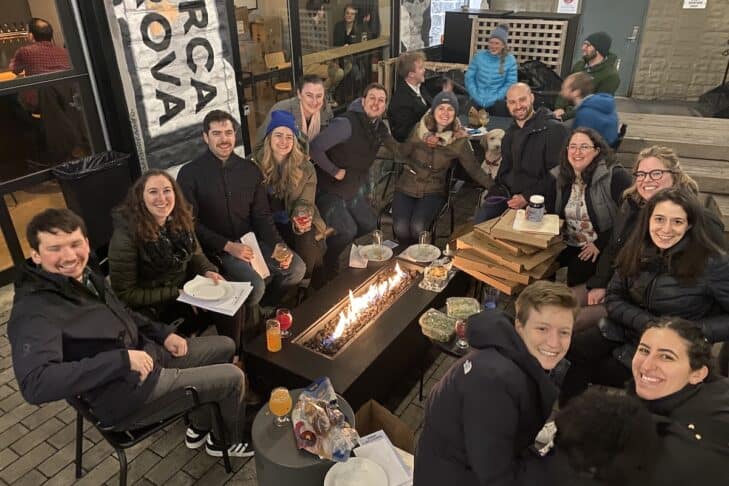Rabbi Jen Gubitz describes part of her work as “constantly noticing fringes in gaps.” For Gubitz, that entails inviting Jews and their partners, who feel distanced or even excluded from the Jewish community, to design Jewish practices into their lives with supportive content and community. Gubitz’s radical inclusion was key to her founding Modern JewISH Couples (MJC) in July 2021, a fiscally sponsored project for committed couples on the pathway to marriage and beyond.
Gubitz’s vision of radical inclusion is as bold as it is welcoming. “Instead of asking people if they are Jewish and expecting a yes or no, we ask people how Judaism shows up in their lives,” she said in a recent interview with JewishBoston. “We must be willing and accepting of how they answer that question and be affirming and supportive.”
For radical inclusion to work, Gubitz said the Jewish community must be open-minded and open-hearted in how they hear the answers. “I want people to be part of the Jewish community,” she said. “We need to stretch the boundaries and barriers that prevent such inclusion.” Gubitz is a Rukin Rabbinical Fellow with 18Doors and has pursued additional training in family therapy through Therapy Training Boston and the Council for Relationships.

Modern JewISH Couples was recently honored with a Signature Grant from the Covenant Foundation to expand its outreach and further its mission. The funding was a vote of confidence in Gubitz that has enabled her to grow Modern JewISH Couples into a national project.
Gubitz also leads the Bmitzvah program at Temple Shalom in Newton. The gender-affirming name that refers to Judaism’s coming-of-age ceremony aligns with Gubitz’s vision of welcoming all teens to celebrate their Jewish coming-of-age. She also leads monthly Friday night Shabbat services for young adults at the Vilna Shul, Boston’s Center for Jewish Culture, and has a monthly podcast, “OMfG: Jewish Wisdom for Unprecedented Times,” with a fellow rabbi.
What was your goal in founding Modern JewISH Couples?
MJC emerged partially out of my experience as a camp song leader and noticing whether people were participating or on the fringes. Then as a rabbi I noticed how different demographics, especially young adults, felt connected or marginalized from Jewish life. Some felt isolated because of who they are or how people perceived them. So it became my passion to create spaces where everyone can be heard and connected. I also noticed how many couples were having their weddings officiated by loved ones instead of clergy. This project stems from a desire to reach people who feel disconnected, to give voice to what is often undiscussed and then transformed into focusing on helping couples have important conversations with their partner as they plan for their life together.
One of your programs is called “Navigating Life’s Journey.” What do those conversations entail?
I bundled the conversations into seven because it’s a symbolic Jewish number. In the wedding ceremony, some beloveds choose to circle each other seven times and offer the seven wedding blessings. So MJC arrived at seven questions, seven conversations. The topics include “home & ritual” and “family & legacy,” which is about exploring a couple’s family of origin and how they want to define what their family looks like moving forward. Does that mean adding tiny humans, or nieces and nephews, welcoming foster children, serving as a mentor or caring for a dog or cat? We talk about societal and generational messages around adulthood and whether or not we want to accept them. We cover money, death, intimacy, rest and food ethics.

What’s an example of a conversation?
Instead of asking, “Do you keep kosher: yes or no?” we consider how what we eat is informed by our backgrounds, identities and values. If we’re talking about ritual, I make sure to share: “You don’t have to hide your Christmas tree from me.” German Jews had Christmas trees. Theodor Herzl had a Christmas tree. While I don’t have a Christmas tree and didn’t grow up with one, I understand that identities are hybrid, and I don’t want people to hide who they are from each other or from the Jewish community.
There must be another affirming way of acknowledging people who say, “I’m not religious. I don’t go to temple that much. I’m a bad Jew. I’m only Jew-ish.” So what if you don’t believe in God? Honestly, I’m not so sure about God either. I want to build something to celebrate the different ways that people establish their lives and help them figure out how to integrate Judaism with strategies they can take home.
Do you primarily work with interfaith couples?
I work with all couples and celebrate the various identities they may hold. There are a few national organizations that support young adult couples, but it’s a big gap in the Jewish community. When I noticed in The New York Times wedding announcements that people had their weddings officiated by friends who received ordination from places like “The Church of the Flying Spaghetti Monster,” I realized we had an educational opportunity to reach couples who have unbundled their lives from Jewish institutions. And it’s not only interfaith couples. Some Jewish couples don’t have a relationship with a rabbi either, and there are many reasons they might not. Instead of saying these couples have opted out of the system, I’m building a new system where I as a rabbi help your best friend or uncle perform your wedding. That’s better than downloading a script from the internet. We’ll train your officiant and provide the couple with wedding education and premarital counseling, too.
Related







